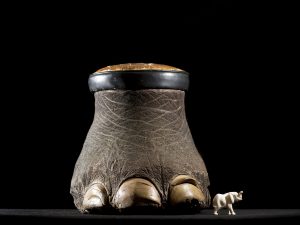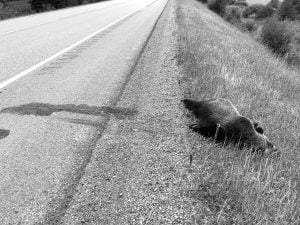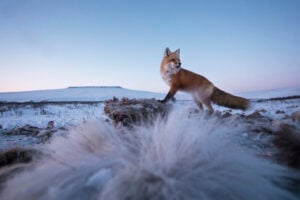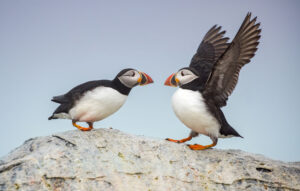My backcountry confidence has reached an all-time high when Jowita Bydlowska, author of the best-selling memoir Drunk Mom, comes to visit.
Lean and full of energy, Jowita has no trouble with the physical challenge of alpine hiking. We spend glorious, hot summer days immersed in wonder. Then, on her last day in the Canadian Rocky Mountains, Jowita says, “Let’s do something big.”
“Yes,” I agree. “Let’s do it! Something big.” The two of us, our manic energy, our minimal experience, our gleeful decision to “go big” — what could possibly go wrong?
“Jowita.” I say her name with urgency, trying to communicate that our adventure has taken a serious turn. “Stop for a minute. Let me get my bearings.” I need one minute to think, but our friendship is too new. We’re being overly polite with each other. If I were with my husband, I’d yell: Marty! Stop right now! I’m not moving. But Jowita keeps moving, and I keep following. Between stretching myself thin, belly pressed against rock, I take brief moments to scan the area for other options. The farther we go, the more our options narrow. We can’t go back down the way we’ve come up. It’s been hard enough ascending. Neither of us has the climbing skills to descend. We’d have to go down backward, like climbing down a ladder. I do not have the nerve. We would end up trying to crabwalk our way down. Potentially fatal. If we could climb out of this groove in the rock, we might be able to get onto the land to our left.
We’re above the treeline now, but the ground on that left side is still green. We might be able to switchback our way through the foliage to the top, where I imagine the trail to be.
“Jowita! What about if we climb out of this —” this crevice or drainage or I don’t even know what to call this feature we’re in. I am no mountain expert. “— this . . .” This freaking hole is what I want to say. “— we climb out of this fissure, and we get onto that . . . green part. The green looks less steep. We could make our way up there.”
“You want to go over there?” Jowita shoots me an incredulous glance. She doesn’t loosen either hand from the rocks above her, but she points her chin at the greenery. “There? No. I’m not.”
“I really think we need to — get to the green part.” I know my repetition betrays me. I have pinned all my hopes on getting to the green part. “Then we can make our own switchbacks. We can ease our way up there through a less steep route, and we can get up to that ridge. The trail must be along that ridge. I’ve done this mountain before. I know exactly where we are.”
Jowita whips her face back around to the rock and sets her limbs in motion. I cannot catch her. I see now that her speed grows out of her fear. She thinks if she can simply keep going fast enough, she will finish and emerge somewhere safe.
When I finally catch Jowita, she has come to a stop only because she has reached a towering wall. She sits with her back pushed into the stone, her knees pulled into her chest. We are very high. She looks terrified. I force an artificial calm. “It’s beautiful,” I say. “Look.” Rocky ridges, sharp peaks, and thick forest surround us in every direction, all through a brilliant filter of perfect midday sunshine, the silence absolute.
Jowita does not seem the least bit interested in beauty. She stares at her running shoes. “You stay here,” I tell her, as if she might move. “I’m going to look around, see if I can spot the trail.”
“Angie.” Her voice roots me to the spot. I’ve never heard her so serious. “I’m scared. We need to call for help. I don’t think you should move anywhere. It’s not safe.”
“It’d be so embarrassing, Jowita, to call for help and find out we’re only twenty meters from the trail. Let me just look.” I can only move a few meters in either direction from where Jowita crouches at the rock wall. I step gingerly on the steep, loose scree. My body won’t let me stand upright, so I walk in an awkward crouch, placing each foot carefully across the slope before taking the next step, my arms stiff out at my sides as if I’m walking a balance beam. I resist the wobble in my ankles, my knees, my hips.
“Angie! Be careful!” Jowita’s voice is high with concern. “Please!”
I regulate my own voice before answering. “It’s fine. I know exactly where we are. I just need to see the trail.” I angle my feet across the scree, not letting them point down at the forest, miles below us. I cannot let myself think about slipping here.
“It’s not as steep as it looks. I promise. Watch me, and you’ll see. Watch how I do it. Then copy me.” I ease my way out of the rocky crack onto the green side of the mountain.
As soon as I’m out there, I realize it’s steeper than it looks. I can’t stand. I’m down on the ground, gripping the green and brown roots so tight they cut into my hands. My feet dangle below me with no hold. I’m belly to the mountain. If the roots let loose from their rocky soil, I will slide to my death, leaving Jowita alone with no idea how to tell anyone where to find her. “Oh no,” I say calmly. “Okay now I am scared.”
It feels good to say it aloud. I hold onto the foliage as tight as I can, checking that I have a handful of different root systems so if one gives, I’ve still got the other. The only direction I can possibly move is down. Using only my arms, moving from clutched root to clutched root, I aim to lower myself to a small flat spot twelve feet below. My triceps and biceps ache. The free fall beneath my feet makes me want to rest my cheek in the dirt and sob. “Okay…okay …okay…,” I whisper to myself with each inch of descent. “Okay…”
I am vaguely aware of Jowita on the phone above me, calling for help. “My address? My address is in Toronto. I don’t see how that — yes — no, I heard you — we are on a mountain — no, I don’t know — My address? In Toronto? You want my address in Toronto? — Okay. My address in Toronto is —”
“Yes, call for help,” I think. “Please call for help.” I am no longer worried about being embarrassed.
When the helicopter arrives, it does not come to us. We hear it approach: it’s coming, it’s coming, it’s coming. Relief floods me: let this be over. Then the helicopter veers the other direction, flying circles around a peak very far away from us. I don’t understand. “It’s not coming,” Jowita says. “Why isn’t it coming?”
Forcibly ignoring my vertigo, I stand up. As soon as I do, I understand. I have told them the wrong spot. I know exactly where we are. How many times have I said it? Well. I have no idea where we are. I gently turn around to face the mountain and take a cautious half step back from the steep slope we’ve been attempting to climb. As easy as that half step, our setting comes into perfect, clear focus. All along, I’ve been trying to get closer to get a good look, and all along I needed to get farther away.
By the time we get home, a press release has appeared online. Fear roars in my scalp when I see the little red circles that mark Jowita and me, up high on the mountain, together but apart. I force a lightness I don’t feel, just as I did on the mountain. Friends come and go from our house all evening to say goodbye to Jowita before her early morning departure for Ontario. They knew our day’s plans, and they saw the incident report on the Search and Rescue Facebook page. Everyone wants to hear the story of our little trust walk. Jowita and I tell it, a little funnier each time. With laughter, we sidestep the true precariousness of our situation.
After the guests go home and Marty and I retreat to our bedroom, my phone dings with a text from Jowita: That was the best day of my life. I’m not even joking. I can’t explain why yet. Thank you.
That night, I wake in terror. There in the dark, with nobody laughing, my body acknowledges how badly the day could have gone. I’m gripping roots on the mountainside, face to the dirt, no safety net between me and death. Buzzing and alert, I feel the panic of my feet hanging in nothing but air. I see my friend — dirty and bruised and cut, clinging to a mountain that she would not even be able to find on a map, depending entirely on me. Panic sears right through my bones. I roll into Marty’s warm, sleeping body. “I’m scared,” I say into the space between his neck and shoulder, “so very scared.”
A good hike is a boring hike. In retrospect, my summer outdoors has been delightfully boring, all except the one day that Jowita and I decided to “do something big.” I save Jowita’s text and read it daily over the next few weeks.
Gradually, I can explain the euphoria, the thrill of coming close to dying and therefore feeling, vividly, the immense gift of life. We grew more alive because of our brush with death. After reflecting, though, I do not feel the same as Jowita does. I will carry this experience with me always, but our helicopter rescue does not make the long list of my life’s best days. I would rather pick our day taking the safe route, away from the moose, or our day walking around a spring-fed lake. I understand being jacked up on the drama of the rescue; I do not need that excitement anymore. I don’t even want it. At fifty, I will, every single time, choose a long, boring walk over sexy rescue guys and a longline helicopter ride. Give me the trees, the silence, the sore feet, the long hours. Give me serenity. Give me boredom.
Excerpted from “This One Wild Life: A Mother-Daughter Wilderness Memoir” by Angie Abdou © by Angie Abdou. Published by ECW Press Ltd. www.ecwpress.com




